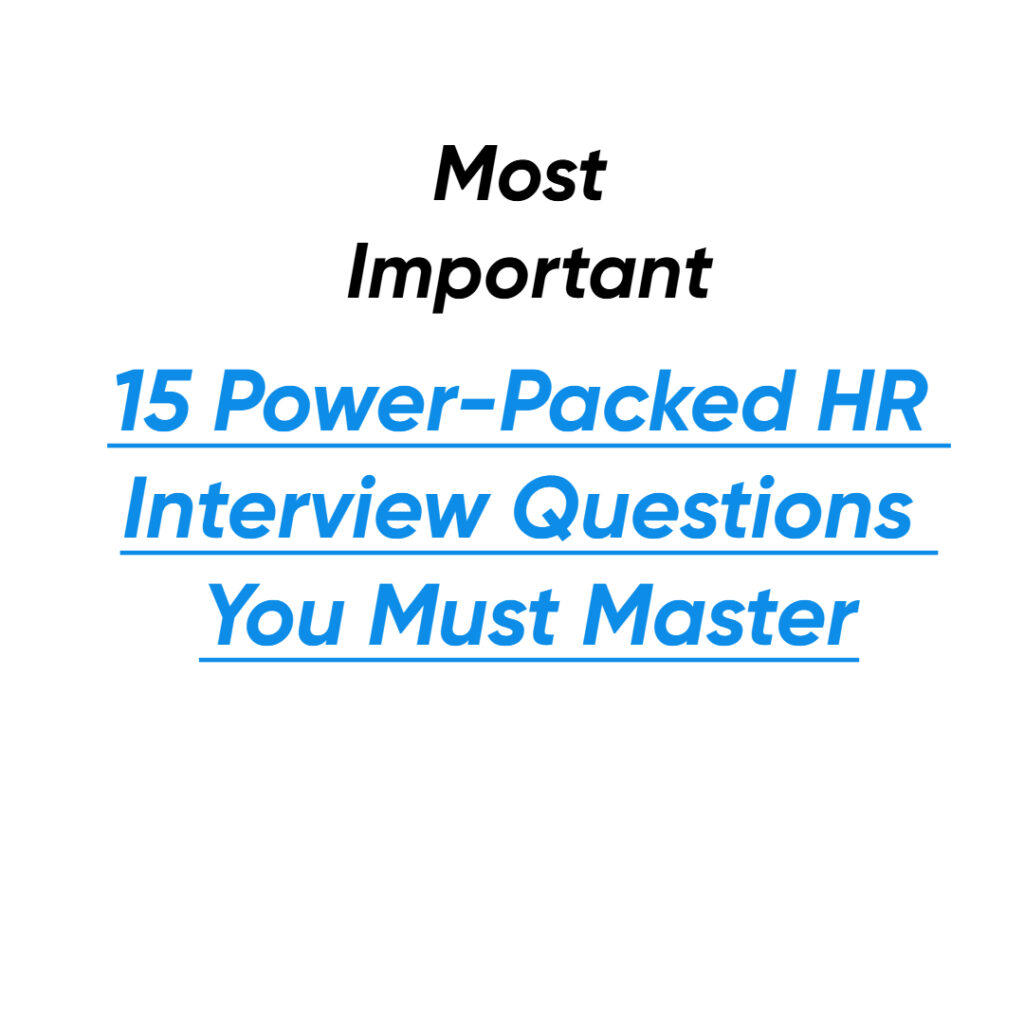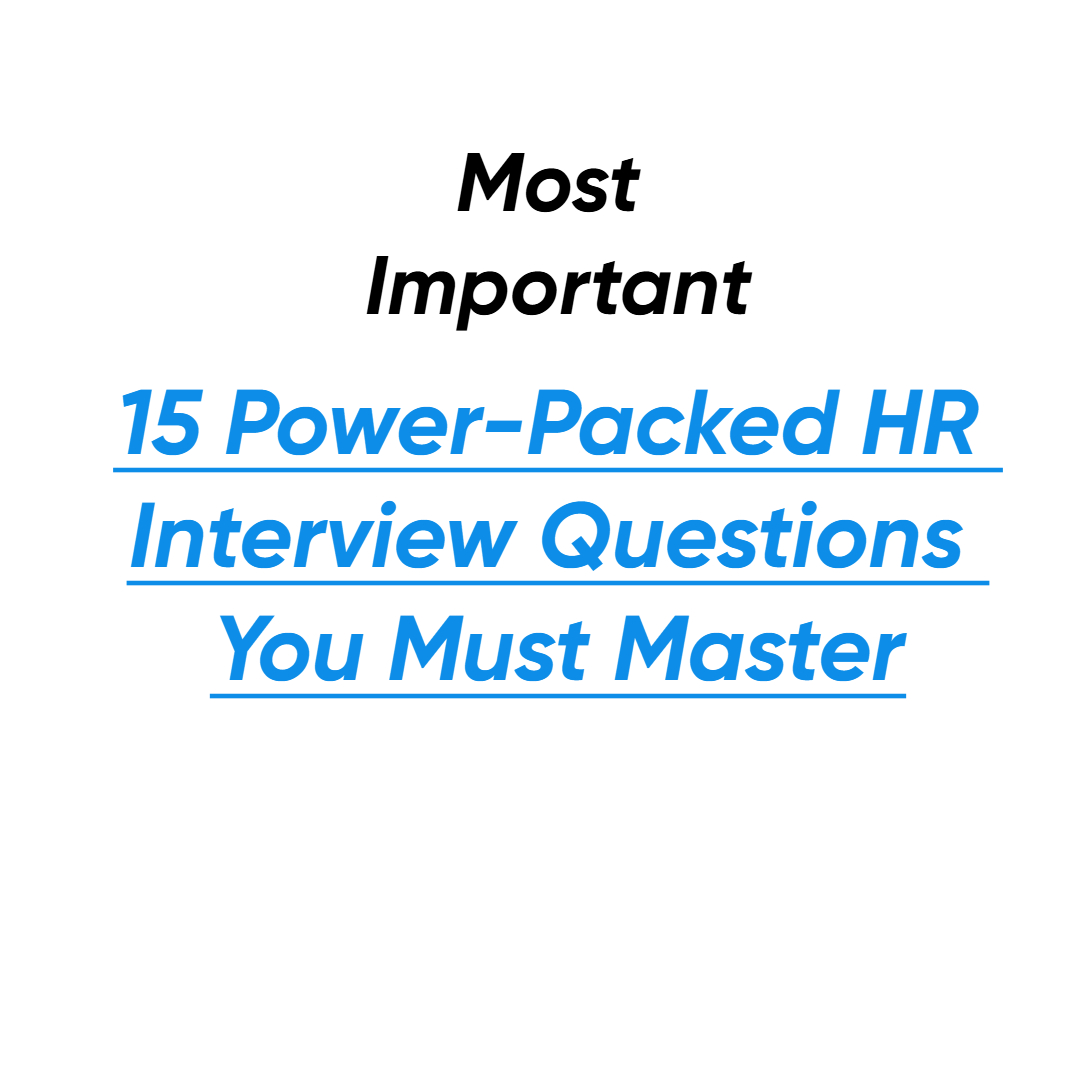Get ahead in your job search with our guide to the most asked HR interview questions. Learn how to answer confidently with these powerful tips and strategies.

Introduction
Landing a job is about more than just your qualifications – how you handle an HR interview plays a major role. Hiring managers often look for candidates who not only have the technical skills but also demonstrate strong interpersonal and problem-solving abilities. To ace your HR interview, it’s essential to anticipate the questions you’ll face and prepare answers that highlight your strengths, experiences, and personality.
In this article, we’ll go through 15 of the most commonly asked HR interview questions with unique answers that you can personalize to suit your style.
1. Tell Me About Yourself.
Answer: This question sets the stage for the rest of the interview. Keep it brief but insightful. Focus on your professional journey, key accomplishments, and your motivation for applying.
Example:
“I’m a project manager with 7 years of experience in the tech industry. My passion for problem-solving and my ability to bring cross-functional teams together have allowed me to successfully launch several software products. I’m drawn to this role because of your company’s innovative culture, and I believe I can add value through my strategic thinking and leadership skills.”
2. Why Do You Want to Work Here?
Answer: Demonstrate that you’ve researched the company and its values. Relate your personal career goals with what the company offers.
Example:
“I admire your company’s commitment to sustainable practices and innovation. I am particularly drawn to your recent initiatives in AI, and I believe my background in data analytics will help further strengthen your data-driven strategies.”
3. What Are Your Strengths?
Answer: Choose strengths that directly relate to the position and provide a specific example of how you’ve demonstrated them in your previous roles.
Example:
“One of my key strengths is adaptability. In my previous role, I was tasked with leading a team through a significant organizational change. By staying open to new approaches and guiding the team through transitions, we were able to meet our goals with minimal disruption.”
4. What Are Your Weaknesses?
Answer: Be honest, but frame your weakness in a way that shows you are self-aware and working on improving it.
Example:
“While I’m great at working independently, I sometimes take on too much responsibility myself. To address this, I’ve started improving my delegation skills, ensuring that I share tasks more effectively with my team while maintaining quality outcomes.”
5. Where Do You See Yourself in 5 Years?
Answer: Align your answer with the company’s growth opportunities and show that you have long-term career goals.
Example:
“In five years, I see myself in a leadership role within the company, managing larger projects and mentoring newer employees. I am committed to continuously learning and growing, and I believe this company offers the resources for that.”
6. Why Should We Hire You?
Answer: Focus on the unique skills and experience that set you apart from other candidates.
Example:
“I bring a unique combination of technical expertise and interpersonal skills. My background in software development, along with my experience in cross-team collaboration, means I can help bridge the gap between engineers and business stakeholders to create impactful solutions.”
7. Tell Me About a Time You Faced a Challenge.
Answer: Use the STAR method (Situation, Task, Action, Result) to structure your response.
Example:
“During a project, our team faced a technical hurdle that delayed our deadline. I took the lead in organizing troubleshooting sessions, which helped us identify the issue. As a result, we not only met our deadline but also improved our process for future projects.”
8. How Do You Handle Stress or Pressure?
Answer: Employers want to know how you react in high-pressure situations. Offer specific examples to show your ability to manage stress.
Example:
“I remain calm under pressure by staying organized. In my previous role, I had to manage multiple deadlines at once. I created a detailed plan, broke tasks into manageable steps, and prioritized based on urgency. This helped me maintain focus and deliver quality work even in stressful situations.”
9. What Motivates You?
Answer: Share what drives you professionally and how this aligns with the role you’re applying for.
Example:
“I am motivated by opportunities for problem-solving and creativity. I thrive in environments where I can collaborate with others to come up with innovative solutions that make a tangible difference.”
10. How Do You Prioritize Your Work?
Answer: Showcase your organizational skills by explaining how you balance competing demands.
Example:
“I use a task management system to organize my workload. I prioritize tasks by urgency and impact, ensuring that I stay on top of both long-term projects and day-to-day responsibilities. This approach helps me maintain high performance without missing key deadlines.”
11. Why Did You Leave Your Last Job?
Answer: Be tactful in your response. Focus on your desire for new challenges or growth, without speaking negatively about your previous employer.
Example:
“I left my previous job because I was seeking more opportunities for career advancement. I felt that my growth was limited, and I’m excited about the potential for learning and development that this position offers.”
12. What Are Your Salary Expectations?
Answer: Do some research before the interview to understand the industry standard for the position. Be open to negotiation.
Example:
“Based on my experience and the research I’ve done, I’m expecting a salary range of $60,000 to $70,000. However, I’m flexible and open to discussing the total compensation package.”
13. Do You Have Any Questions for Us?
Answer: Always come prepared with thoughtful questions. This shows your interest in the role and company.
Example:
“I’d love to know more about the team I’ll be working with and the company’s approach to professional development. Additionally, what are some of the immediate challenges the company is facing that I would be expected to help address?”
14. How Do You Handle Conflict in the Workplace?
Answer: HR wants to know how you deal with interpersonal challenges. Highlight your ability to manage conflicts diplomatically.
Example:
“I approach conflict with a calm and constructive mindset. In my previous role, I resolved a team disagreement by facilitating a discussion where each person could express their concerns. Together, we found a compromise that allowed the project to move forward smoothly.”
15. What Makes You Unique?
Answer: Use this as an opportunity to highlight what sets you apart from other candidates. Focus on your combination of skills and experiences.
Example:
“I believe my combination of technical expertise and strong interpersonal skills makes me unique. I have a deep understanding of analytics and data-driven strategies, but I also excel at collaborating with non-technical teams to ensure the data is actionable.”
Conclusion
Preparing for an HR interview is not just about knowing the right answers but also about presenting yourself as a confident, capable, and well-rounded candidate. By understanding the most commonly asked questions and practicing your responses, you can approach your interview with a sense of purpose and readiness. The key is to be authentic, show enthusiasm for the role, and communicate your unique value.
Don’t miss this opportunity to grow with one of the world’s leading IT companies
Whatsapp Group Link – https://chat.whatsapp.com/FBEUq5RQ9pNLft7vGEouZhttps://chat.whatsapp.com/FBEUq5RQ9pNLft7vGEouZx
Join Our Whatsapp group for more job related information
Explore more jobs

Vacancy available for Data Science
Capgemini Automation engineer
Tips To get hired :
Start with a plan. …
Customize your resume.
Keep your resume short.
Customize your cover letter.
Showcase your accomplishments.
Build and utilize your network.
Diversify your job search.
Keep applying for jobs.
Follow this tips for getting a job.


